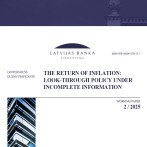Lowest annual inflation to have been likely reached
In April 2013, annual inflation became negative (-0.4%), while under the impact of seasonal and some cost factors consumer prices remained unchanged during the month.
On a monthly basis, overall inflation was notably affected by falling fuel prices (by 1.6%) on the backdrop of still favourable oil price dynamics. Some cost decline had a favourable impact on the prices of transportation services and of a number of goods and services representing core inflation for which a slight price increase might have been expected, e.g. due to heated discussions about costlier electric energy for industrial consumers. In the meantime, price rises were primarily observed in those consumption groups representing core inflation which are subject to seasonal effects, e.g. clothing and footwear recorded a 4.6% price spike.
Annual core inflation has not "recovered" either in cost or demand factor terms and was negative in April, substantially reducing the overall annual inflation level. This low level of inflation is still rooted in both cost and other factor dynamics of the basis period. For instance, in April of the previous year, fuel prices hiked dramatically on account of the high oil prices, thus giving rise to a high basis for price comparisons. In April of the current year, however, they declined and thus alleviated cost pressures in many sectors. In the spring of last year, the eggs market experienced a temporary "turmoil", yet the prices soon stabilised and even went down thereafter. In April of the current year, egg prices, partly due to an increase in supply, stood 13.4% behind those of April 2012.
It is quite likely that the lowest level of current year's annual inflation has already been reached. For months to come, such basis factors as the fuel price downslide in May and June of the last year, reduction of value added tax in July, and lowering of heating costs in November apparently pave the way for a wider gap between the respective months' price levels of the current year and 2012.
There are, however, other factors that point to rather confined price hikes. Electricity market liberalisation may materialise later than has been planned (autumn of this year), while the downward trend in the 9-month price of heating oil points to an eventual reduction in natural gas and heating tariffs in mid-year according tothe current heating tariff tables (i.e. even if the approval of new tariff plans is postponed in several major cities). Potential price hikes for a number of widely used goods and services are likely to be curbed by the on-going price observation activities related to the euro changeover whose first results have already been released on the website of the Ministry of Economics. It should also be noted that the economic growth has presently become more moderate vis-á-vis the previous year and is not inducing any demand pressures on the price level.
Textual error
«… …»






